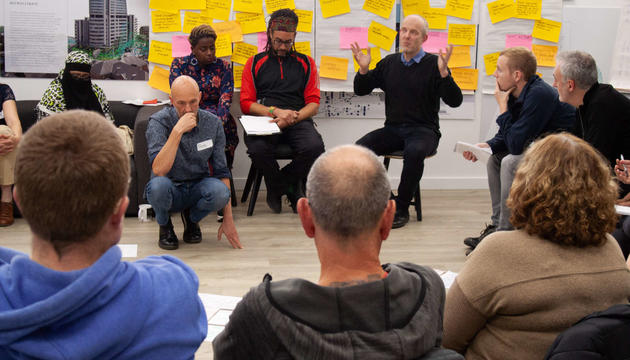
Climate Assemblies and Juries: A people-powered response to the climate emergency
18th August 2020 - 15:23
A guide to support local authorities and other bodies thinking of commissioning a citizens’ assembly or jury has been published by Shared Future CIC. Funded by the Place-based Climate Action Network (PCAN), the guide considers how such processes might address the climate emergency, what is involved and approaches to design and delivery.
There has been a flourishing of citizens’ assemblies on climate change in the UK, with many local authorities commissioning local assemblies and juries, often as a follow up to declaring a ‘climate emergency’. Nationally, a citizens’ assembly on climate change, commissioned by parliamentary select committees, has completed its final deliberative weekend and will publish its report in September 2020. At the same time in France, President Macron commissioned a citizens’ assembly on climate change with formal power to shape policy.
What is a citizens' assembly or jury?
Typically assemblies and juries bring together between 20 and 150 members of the public to deliberate for over 25 hours. The members are randomly selected to a profile that reflects the diversity of the population the process is serving. After sharing ideas and opinions with each other and hearing from a range of outside speakers, the participants write a set of recommendations.
Depending on how they are designed and commissioned, these type of deliberative mini-publics can be a tool for creating public dialogue, be used for identifying nuanced public opinion on a topic, and are useful for building consensus, for producing a set of prioritised recommendations or creating space for public engagement within policy making.
When done well, commissioning a citizens’ assembly or jury can be truly transformative for the commissioning body, the participants, and for the wider public. They can create a robust mandate for politicians to take action. They can improve trust between citizen and government, produce better and fairer policies and act as a catalyst for better partnership working amongst the range of organisations that may have a role to play in addressing the climate emergency.
'How to' guide
The report is in two sections. Part 1 examines how citizens' assemblies and juries can address the climate emergency; Part 2 breaks down into detail how to design an impactful citizens' assembly or jury and includes how to take them online. Other sections look at strategies for recruitment, the role of the speaker or commentator, structuring the sessions, tools for deliberation and learning, and setting the question.
It is written by Peter Bryant of Shared Future CIC (who also facilitated the Leeds Climate Change Citizens' Jury) and Lucy Stone of Our Common Climate. Funding was from round 1 of the PCAN Fund.



